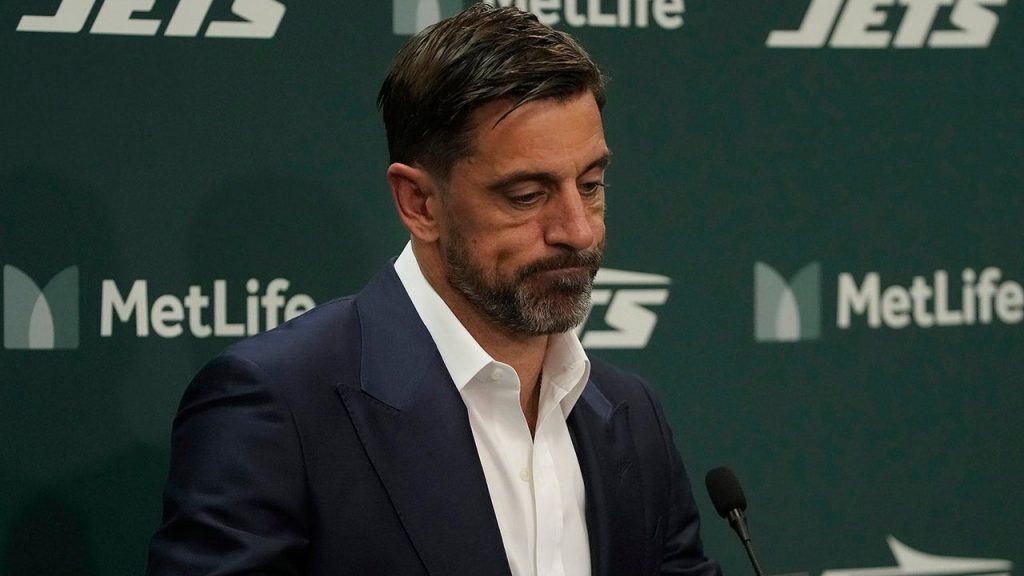Aaron Rodgers Contemplates Retirement Amidst Disappointing Jets Season
Aaron Rodgers, the veteran quarterback of the New York Jets, has publicly acknowledged the possibility of his retirement from professional football following the team’s season finale against the Miami Dolphins. While no definitive decision has been made, Rodgers’s candid remarks suggest a strong inclination towards hanging up his cleats. His comments reflect a confluence of factors, including the team’s dismal performance, impending regime change, and the physical toll of a long and illustrious career.
Rodgers’s first season with the Jets was marred by a season-ending Achilles injury sustained in the opening game against the Buffalo Bills. This year, despite remaining healthy throughout the season, the Jets have stumbled to a 4-12 record, a far cry from the playoff aspirations that accompanied Rodgers’s arrival. The disappointment is palpable in Rodgers’s reflections on the season, acknowledging both his personal and the team’s shortcomings.
The impending changes within the Jets organization also contribute to Rodgers’s retirement considerations. The mid-season firing of head coach Robert Saleh and general manager Joe Douglas, the very individuals who orchestrated his arrival in New York, signals a shift in direction. Rodgers recognizes the likelihood of not being part of the new regime’s plans and expresses a willingness to accept their decision. He expects a swift resolution regarding his future with the team, anticipating a conversation with the incoming general manager.
The physical demands of the game have also taken their toll on the 39-year-old quarterback. Rodgers recently surpassed Tom Brady as the most sacked quarterback in NFL history, a testament to the relentless pressure he has faced throughout his career. This season alone, he has been sacked 37 times, further underscoring the physical burden he has endured. While he has not explicitly cited physical strain as a primary reason for contemplating retirement, its impact on his decision-making process cannot be overlooked.
Despite the on-field struggles and organizational uncertainties, Rodgers maintains a positive outlook, emphasizing the personal growth and relationships he has cultivated during his time with the Jets. He describes the past two years as the "best of his life," highlighting a newfound appreciation for the game and the connections he has forged with his teammates and colleagues. This perspective suggests that retirement, while a significant decision, would not be driven by bitterness or resentment. Rather, it would represent a conscious choice to prioritize personal well-being and embrace a new chapter in his life.
Rodgers’s contemplation of retirement marks a potential turning point in a career defined by exceptional talent and unwavering dedication to the game. His journey, from a highly touted prospect to a Super Bowl champion and multiple-time MVP, has captivated fans and cemented his place among the NFL’s elite quarterbacks. As he weighs his options, the football world awaits his decision with bated breath, recognizing that the departure of a player of Rodgers’s caliber signifies the end of an era. Regardless of his ultimate choice, Rodgers’s legacy as one of the game’s most gifted and compelling figures will endure.
Rodgers’s future remains uncertain, but his reflections offer a glimpse into the complex considerations that weigh on a veteran athlete nearing the end of their career. The disappointment of unmet expectations, the impending organizational changes, and the cumulative physical toll of years of competition all contribute to the difficult decision he faces. However, amidst these challenges, Rodgers expresses gratitude for the experiences and relationships he has gained, suggesting a sense of peace with whatever path he ultimately chooses.
The Jets’ final game against the Dolphins may indeed be the last time Aaron Rodgers takes the field as a professional football player. While he has not explicitly confirmed his retirement, his comments indicate a strong likelihood of stepping away from the game. The combination of the team’s struggles, the impending regime change, and the physical demands of the sport have created a convergence of factors that point towards retirement. Rodgers’s decision, expected before the start of free agency in March, will mark the end of a remarkable career for one of the NFL’s most iconic quarterbacks.
His journey, from a highly touted prospect to a Super Bowl champion and multiple-time MVP, has been marked by both triumphs and setbacks. The disappointment of the Jets’ 4-12 season and the uncertainty surrounding the team’s future direction undoubtedly contribute to his contemplation of retirement. However, Rodgers’s reflections also reveal a newfound appreciation for the game and the relationships he has built, suggesting that his decision will be made with a sense of peace and gratitude.
The physical toll of a long and illustrious career, including the ignominious record of being the most sacked quarterback in NFL history, further underscores the challenges Rodgers has faced. While he has not explicitly cited physical limitations as a primary reason for considering retirement, their impact on his decision-making process cannot be disregarded. The cumulative effect of years of hits and the increasing demands of maintaining peak performance at his age inevitably factor into the equation.
Regardless of his ultimate decision, Rodgers’s legacy as one of the most gifted and captivating quarterbacks of his generation is secure. His ability to extend plays, his pinpoint accuracy, and his improvisational skills have enthralled fans and frustrated opponents throughout his career. He has been a true game-changer, a player capable of single-handedly altering the course of a game. As he contemplates retirement, the football world awaits his final decision with a mix of anticipation and nostalgia, recognizing that the departure of a player of Rodgers’s caliber marks the end of an era.
Rodgers’s reflections on his time with the Jets offer a poignant reminder of the complex emotions that accompany the twilight of a professional athlete’s career. The disappointment of unmet expectations, the physical toll of years of competition, and the prospect of an uncertain future all contribute to the difficult decision he faces. However, amidst these challenges, Rodgers expresses gratitude for the experiences and relationships he has gained, suggesting that his decision will be made with a sense of peace and gratitude. He has found a renewed love for the game and a deeper appreciation for the people who make it special.
Whether he chooses to continue playing or embark on a new chapter in his life, Aaron Rodgers’s impact on the game of football will endure. His talent, his charisma, and his unwavering dedication have left an indelible mark on the sport. He has inspired countless young athletes and entertained millions of fans throughout his career. As he stands at this crossroads, his decision will be respected and his contributions to the game will be celebrated.















